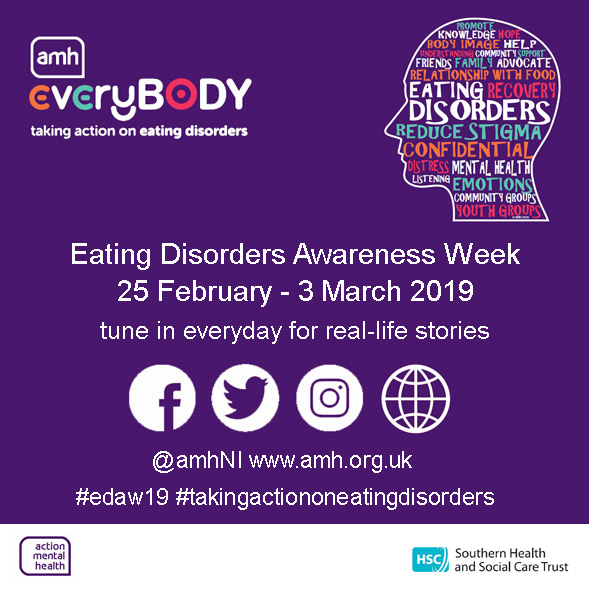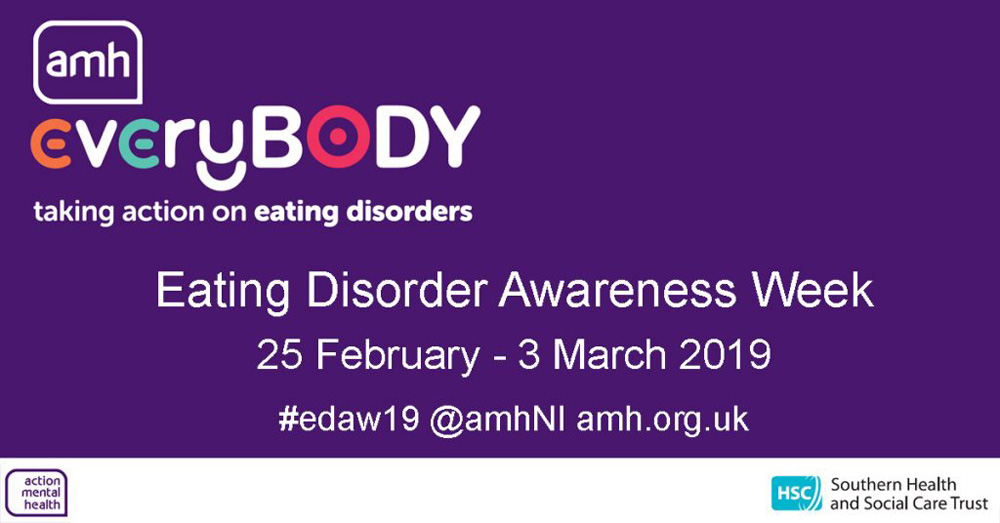 This week is Eating Disorders Awareness Week – an international event devised to fight the myths and misunderstanding that surround anorexia, bulimia, binge eating disorder and EDNOS – disorders that are similar to but not exclusively characteristic of anorexia or bulimia.
This week is Eating Disorders Awareness Week – an international event devised to fight the myths and misunderstanding that surround anorexia, bulimia, binge eating disorder and EDNOS – disorders that are similar to but not exclusively characteristic of anorexia or bulimia.
The theme of this year’s focus is ‘Why Wait?’ – due to the alarming fact that on average, 149 weeks pass before those experiencing eating disorder symptoms seek help.
That’s almost three years or 1,043 days. That’s too long to wait for anyone, especially in light of statistics which show that eating disorders claim more lives than any other mental illness, with one in five of the most seriously affected dying prematurely from the physical consequences or by suicide. That’s why Action Mental Health’s eating disorder service everyBODY was launched. Operating in the Southern health trust area since 2000, it was formerly known as ADAPT but was relaunched in September 2018 as AMH everyBODY.
EveryBODY employs a preventative, interventionist and postvention approach, targeting the general public with awareness-raising sessions to equip people with the knowledge and skills necessary to self-support or seek help.
It also supports people affected by eating disorders, including family members and friends, to support recovery, and develops effective partnerships to ensure comprehensive, progressive support.
In light of the alarming suicide rate linked to eating disorders, AMH everyBODY promotes a greater understanding and awareness of these conditions. It promotes positive lifestyle choices, about eating to develop preventative and self-supporting skills. It also exists to help break the associated stigma – including unhelpful assumptions that it is attention-seeking behaviour or fad dieting that stops people seeking the support they need: in short, having an eating disorder is a serious mental health condition.
The focus of AMH everyBODY’s approach is recovery through partnership; a partnership between the person, their family and the Southern Health and Social Care Trust, who all work collectively to provide comprehensive support towards recovery. AMH everyBODY provides much needed support not only to the person affected but also to their families and friends at the Carers’ Group monthly meeting.
Eating disorders affect over 700,000 women and men in the UK at any one time, with research suggesting that this figure is vastly underestimated. It is thought some 80% of individuals who screen positively for having an eating disorder have never accessed help or support. One of the most harmful symptoms of an eating disorder is silence – AMH everyBODY encourages people affected to speak out for support and know that a listening, understanding and confidential ear will be there to provide support towards recovery.
As a community, part of spreading this awareness is by reducing some of the myths and misconceptions around eating disorder.
It is clear from our experience with clients how damaging misunderstanding, stigma and ignorance can be for both the person affected and their families. Indeed, there is no doubt that this stigma and ignorance can act as a major barrier to identification, early intervention and ultimately recovery from the illness.
Action Mental Health’s Deborah McCready, everyBODY Project Worker said: “AMH everyBODY exists to bridge the gap on the clients’ journey from the moment they seek help until they get to speak to a medical expert, as with existing waiting lists this can be some time.
“When people have taken that important step and are willing to engage and seek help AMH everyBODY offers a recovery approach in sessions when people will receive information and support to develop skills, stay focused and healthy until they see a therapist.” Prior to appointments people can feel unsupported and alone, contact with AMH everyBODY at this time will help people support themselves and get the best from their therapist when they meet.
Some of the myths and misunderstandings heard by AMH everyBODY project workers include:
“Eating disorders are a choice”
Eating disorders are serious psychological illnesses which NO-ONE can CHOOSE to develop. Eating disorders develop as a result of a complex interaction between psychological, social and biological factors. Each person’s experience of an eating disorder will be unique to them. No-one can choose to develop an eating disorder;
“Only females develop eating disorders”
Anyone can develop an eating disorder, regardless of gender. Men can and do develop eating disorder. Eating disorders do not discriminate along any lines whether that is gender, race, socio-economic status or age;
“You must be really thin to have an eating disorder”
Eating disorders are serious psychological illnesses which cannot be fully assessed on objective measures such as weight and shape. Eating disorders come in all shapes and sizes and you cannot tell by looking at someone whether or not they have an eating disorder. Many people who may appear to be within a normal weight range can actually be seriously struggling with a very serious eating disorder;
“Eating disorders are just a phase”
Eating disorders are serious psychological illnesses and must be treated as such. Early intervention and support is vital and greatly improves prognosis of the illness. If you suspect you have an eating disorder or you suspect a loved one has an eating disorder, please seek help now. Eating disorders do not just go away;
“Eating Disorders are a diet”
Eating disorders are serious psychological illnesses they are most definitely not a diet;
“Eating Disorders are a teenage illness”
While evidence indicates that adolescence is an extremely vulnerable stage for the development of an eating disorder, eating disorders can and do develop at any age. Eating disorders do not discriminate and anyone at any age can develop an eating disorder;
“Recovery is rare”
People can and do recover from eating disorders. Recovery is always possible. Recovery can take time and it can be extremely challenging but recovery is always possible. As a community we can improve awareness of Eating Disorders by being aware of these misconceptions and changing the conversation. Ensuring that there is an open conversation on the subject and removing any shame attached. Eating Disorders do not have a shape or size, they can affect anyone, anywhere, and everyBODY is deserving of help and support.
